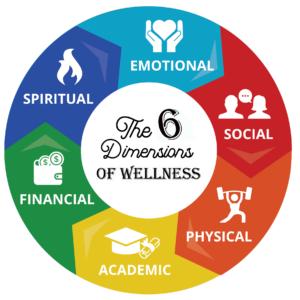Most people chase physical health like it’s the be-all and end-all of well-being. They stack their plates with organic grass-fed steak, down their raw milk, and hit the gym like their life depends on it (because, well, it kind of does). But what about the health of your mind? Not just mental health—though that’s crucial—but intellectual wellness.
Intellectual wellness is the art and science of keeping your brain sharp, engaged, and continuously growing. It’s about curiosity, creativity, critical thinking, and an insatiable hunger for learning. If your body is the vehicle, then your mind is the driver—neglect one, and you won’t get very far.
The modern world, however, doesn’t exactly encourage intellectual wellness. Instead of deep thinking, we’re drowning in quick dopamine hits—TikTok scrolls, Netflix binges, and whatever today’s outrage is on Twitter.
But you? You’re here because you know better. You want to exercise your brain like a muscle, sharpening it for life’s challenges, making it more adaptable, and, quite frankly, keeping yourself from becoming an NPC (non-playable character, for those out of the gaming loop).
So let’s break it down. Why is intellectual wellness so important, and what can you do to cultivate it?
Intellectual Wellness as a Piece of Holistic Health
The six dimensions of wellness—physical, emotional, spiritual, social, occupational, and intellectual—are interconnected, forming

a dynamic balance that affects overall well-being. Most people focus on the first few but forget that intellectual wellness plays a critical role in shaping our daily experiences, decision-making abilities, and long-term health.
Lack of intellectual engagement can lead to stagnation, mental fatigue, and an overall decline in quality of life. When intellectual wellness is nurtured, however, it enhances all other aspects of wellness:
Physical wellness: A strong, well-functioning brain leads to better health choices, stress management, and overall resilience.
Emotional wellness: A sharp mind is better equipped to process emotions, solve problems, and cope with adversity.
Social wellness: Intellectual stimulation leads to more meaningful conversations and deeper connections with others.
Spiritual wellness: Critical thinking helps people explore their values, beliefs, and philosophies with greater depth.
Occupational wellness: Continuous learning and problem-solving skills lead to professional growth and job satisfaction.
Intellectual wellness isn’t just a bonus feature of well-being—it’s a core component of a thriving life.
The Brain Gains: Why Intellectual Wellness Matters
Your mind is your greatest tool, yet so many people let it dull over time. Just like physical fitness, intellectual wellness requires effort and intentionality. A well-trained mind sharpens your problem-solving skills, strengthens resilience, and enhances creativity. In a world full of distractions, cultivating intellectual wellness isn’t just a luxury—it’s a necessity for personal growth, adaptability, and long-term fulfillment.
1. It Keeps You Sharp As You Age
The brain is a “use it or lose it” organ. The more you challenge it, the more neural connections it forms, keeping it young and adaptable. Ever met an older person who’s mentally quick, full of wisdom, and still learning new things? They’ve spent a lifetime building those mental muscles.
Conversely, a lack of intellectual stimulation can lead to cognitive decline. Studies suggest that engaging in lifelong learning reduces the risk of neurodegenerative diseases like Alzheimer’s. Your brain, much like your muscles, atrophies without use.
2. It Improves Critical Thinking (and We Need More of That)
Intellectual wellness isn’t just about memorizing facts—it’s about analyzing them. It’s about questioning assumptions, detecting biases, and thinking independently. In today’s world of misinformation, critical thinking is a survival skill. It helps you navigate everything from politics to personal decisions with clarity and confidence.
3. It Enhances Problem-Solving Skills
Whether you’re an entrepreneur, athlete, or parent, problem-solving is a superpower. A well-trained mind helps you think through challenges, weigh options, and come up with creative solutions. Intellectual wellness isn’t about knowing all the answers—it’s about knowing how to find them.
4. It Boosts Mental Resilience
A flexible mind is a resilient mind. People who cultivate intellectual wellness are more adaptable to change, less likely to get stuck in rigid thinking, and better at handling life’s inevitable curveballs. When you see life as an ongoing learning experience, failures become lessons rather than roadblocks.
5. It Makes You More Interesting
Let’s be honest—people who never challenge their minds tend to be boring. They recycle the same talking points, watch the same TV shows, and resist new ideas like their life depends on it. On the other hand, people with strong intellectual wellness bring depth to conversations. They have unique perspectives, great stories, and a natural curiosity that makes them magnetic.
How to Cultivate Intellectual Wellness (Without Making It Feel Like Homework)
Intellectual growth doesn’t have to feel like cramming for an exam or slogging through dense textbooks. In fact, some of the most powerful ways to enhance intellectual wellness are enjoyable, engaging, and seamlessly woven into daily life. Whether it’s through thought-provoking conversations, brain-boosting activities, or simply staying curious, small intentional efforts can make a big impact.
Here’s how to keep your mind sharp and thriving—without it feeling like a chore.
1. Read Like Your Brain Depends on It (Because It Does)
If you read for 30 minutes a day, you’ll consume over 30 books per year. That’s life-changing knowledge at your fingertips. But don’t just read the same genre—mix it up. Read history, philosophy, psychology, and even fiction (yes, novels can make you smarter too). Reading expands your mental horizons, improves vocabulary, and strengthens comprehension skills.
2. Challenge Yourself With Brain-Boosting Activities
Brain teasers, puzzles, chess, Sudoku—anything that forces you to think critically helps create new neural pathways. It’s like weightlifting for your mind. Bonus: Activities like these also help with dopamine regulation, giving you a natural mental high that’s better than doom-scrolling social media.
3. Learn a New Skill (or Reignite an Old One)
Your brain thrives on novelty. Whether it’s learning a new language, picking up an instrument, or trying a new hobby like woodworking or painting, novel experiences keep your neurons firing. Studies show that learning new skills enhances neuroplasticity, the brain’s ability to reorganize itself.
4. Engage in Deep Conversations
Small talk is fine, but deep discussions are where real growth happens. Seek out people who challenge your perspectives and force you to articulate your thoughts. Debating ideas—without getting emotionally defensive—helps refine your thinking and sharpens your intellect.
5. Write (Even If No One Reads It)
Writing isn’t just for authors. It’s an excellent way to process thoughts, structure ideas, and develop clear communication skills. Keeping a journal, writing essays, or even starting a blog helps solidify your learning and forces you to engage with information more deeply.
6. Prioritize Mental Rest
Your brain needs time to process and integrate information. Journaling, meditating, or simply taking quiet walks without distractions allows ideas to settle. Some of the best insights come when you give your brain the space to breathe.
7. Take Care of Your Body
Your brain is part of your body, and its function depends on your overall health. Nutrition, sleep, hydration, and exercise all play crucial roles in cognitive function. Prioritize high-quality animal proteins, healthy fats, and micronutrients that fuel brain health. Avoid inflammatory foods, processed garbage, and seed oils that wreak havoc on cognitive function.
And yes—get enough sleep. Sleep deprivation isn’t a badge of honor; it’s a brain killer. Your mind needs deep rest to consolidate learning, process emotions, and recharge for the next day.
The Connection Between Brain Health and Intellectual Wellness
While strengthening the mind is critical, it’s impossible to separate intellectual wellness from brain health. The brain is the biological machine powering every thought, decision, and creative spark—if it’s inflamed, sluggish, or malnourished, intellectual wellness will suffer no matter how much you read or debate.
What’s Damaging Your Brain?
Modern life is filled with hidden threats to cognitive function. If you’ve ever struggled with brain fog, difficulty focusing, or memory lapses, consider the following culprits:
1. EMFs and Cognitive Decline
Chronic exposure to electromagnetic fields (EMFs) from phones, Wi-Fi, and electronics may contribute to oxidative stress and neurodegeneration. Research suggests that EMFs can disrupt the blood-brain barrier, increase inflammation, and interfere with cellular function in the nervous system. Over time, this exposure can lead to cognitive impairment, decreased attention span, and an increased risk of neurodegenerative diseases such as Alzheimer’s and Parkinson’s. Studies have also shown that EMF exposure may reduce melatonin production, impairing sleep quality, which is crucial for cognitive repair. Since we are constantly surrounded by wireless devices, mitigating EMF exposure through tools like Aires EMF protection, minimizing Bluetooth and Wi-Fi usage, and grounding techniques can help reduce the risk of long-term damage.
2. Microplastics and the Nervous System
These tiny invaders are found in our food, water, and even the air, disrupting hormone function and potentially impairing neurological processes. Studies have shown that microplastics can accumulate in the brain, leading to oxidative stress and neuroinflammation, which are precursors to cognitive decline. The human body was never designed to process plastic particles, and their presence in our bloodstream and tissues has been linked to endocrine disruption, immune dysfunction, and reduced cognitive function. The worst part? Microplastics have been detected in 100% of placental and testicle samples tested in recent studies, meaning we are being exposed to these harmful particles from birth. To reduce exposure, avoid plastic-packaged foods, use glass or stainless steel containers, filter drinking water with a high-quality system like AquaTru Reverse Osmosis, use probiotics with strains like bifidobacterium longum (one of many proven to excrete microplastics), and opt for natural fibers over synthetic materials.
3. Chronic Stress and Inflammation
Elevated cortisol levels due to chronic stress can wreak havoc on neurotransmitters, impairing focus and mental clarity. The human body was designed for short bursts of stress (like running from predators), but modern life keeps us in a prolonged state of fight-or-flight due to work demands, social pressures, and environmental toxins. Chronic stress increases inflammation, which in turn leads to a decline in cognitive function, weakened memory retention, and an increased risk of anxiety and depression. Worse yet, stress disrupts sleep cycles, reducing the brain’s ability to detoxify and repair itself. Managing stress through meditation, breathwork, daily movement, and time in nature can dramatically improve cognitive clarity and long-term brain health.
4. Insulin Resistance and Brain Fog
Poor metabolic health impacts cognition, increasing the risk of conditions like Alzheimer’s (also known as Type 3 Diabetes). When insulin resistance develops, glucose struggles to enter brain cells efficiently, depriving neurons of the energy they need to function properly. This leads to brain fog, poor memory, and difficulty concentrating. Over time, insulin resistance contributes to neuroinflammation, impairs synaptic plasticity, and accelerates cognitive decline. Diets high in processed carbohydrates and refined sugars exacerbate this issue by causing frequent blood sugar spikes, leading to crashes that make it hard to focus or retain information. Reducing refined carbohydrates, increasing healthy fats, and prioritizing protein-rich meals can help stabilize blood sugar and improve cognitive function.
What Supports a Healthy Brain?
If you want optimal intellectual performance, you have to fuel the brain like a high-performance engine. Some of the most powerful neuroprotective factors include:
1. Magnesium for Cognitive Function
– This mineral plays a crucial role in brain health by regulating neurotransmitters, supporting synaptic plasticity, and reducing brain inflammation. Magnesium is essential for over 300 enzymatic processes in the body, many of which directly impact cognitive function. It helps balance calcium levels in the brain, preventing excitotoxicity (overactive neurons that can lead to cell death). Studies have linked magnesium deficiency to an increased risk of neurodegenerative diseases, anxiety, and poor memory. Because many people are deficient due to depleted soil nutrients and processed diets, supplementing with a high-quality form of magnesium can support cognitive function, reduce brain fog, and improve sleep quality.
2. Grass-Fed Steak and Healthy Fats
– High-quality animal proteins provide essential amino acids and omega-3 fatty acids that enhance neuronal function. Grass-fed beef is rich in vital nutrients such as B vitamins, iron, zinc, and conjugated linoleic acid (CLA), all of which support brain energy production and neuroprotection. Omega-3s, particularly DHA and EPA, are critical for maintaining brain cell membranes, reducing inflammation, and supporting neurotransmitter function. The modern diet is severely lacking in these essential fatty acids due to the widespread consumption of vegetable oils and processed foods, which are high in inflammatory omega-6s. Incorporating grass-fed meats, wild-caught fish, pastured eggs, and organic raw dairy can drastically improve cognitive clarity, reduce brain fog, and support long-term neurological health.
3. Deep, Restorative Sleep
Your brain detoxifies and consolidates learning during sleep, making high-quality rest essential for sharp cognition. Sleep is when the brain’s glymphatic system clears out metabolic waste, including beta-amyloid plaques associated with Alzheimer’s disease. Sleep deprivation reduces reaction time, weakens problem-solving skills, and diminishes memory retention. A lack of deep sleep has also been linked to increased levels of cortisol, insulin resistance, and systemic inflammation, all of which negatively affect brain function. Prioritizing sleep hygiene—such as avoiding blue light before bed, using mouth tape to promote nasal breathing, keeping the bedroom cool, and following a consistent bedtime routine—can significantly improve mental clarity and cognitive performance.
4. Reducing Toxic Load
Avoiding processed foods, seed oils, and environmental toxins can drastically improve mental clarity and overall brain function. Many common food additives, pesticides, and artificial sweeteners have neurotoxic effects, disrupting neurotransmitter balance and leading to cognitive decline. Endocrine disruptors found in plastics, synthetic fragrances, and personal care products interfere with hormone regulation, further impairing cognitive function. To minimize toxic exposure, opt for organic, whole foods, filter drinking water, use glass or stainless steel food storage containers, and eliminate synthetic air fresheners and cleaning products from your home. Even small changes can have a significant impact on reducing inflammation and supporting long-term brain health.
Final Thoughts: The Never-Ending Journey of Intellectual Growth
Intellectual wellness is not just about expanding knowledge—it’s about cultivating a lifelong growth mindset. It’s about approaching life with curiosity, questioning the status quo, and actively seeking out new ideas, skills, and perspectives.
By prioritizing intellectual wellness, you sharpen your ability to think critically, solve problems efficiently, and engage meaningfully with the world. Whether it’s through reading, deep conversations, learning new skills, or nourishing your brain with the right foods and habits, every effort you make contributes to a healthier, more vibrant mind.
But remember, your intellectual wellness is only as strong as your brain health. Fueling your brain with proper nutrition, protecting it from modern-day toxins, and ensuring it gets the restorative sleep it needs will set the foundation for peak mental performance. A sharp mind isn’t just about the information you consume—it’s about how well your brain can process and apply it.
In a world full of distractions, choosing to think deeply, learn continuously, and prioritize cognitive well-being is a bold and powerful act. The ability to grow intellectually is not reserved for scholars or geniuses—it’s a choice available to everyone, every single day.
Choosing to cultivate your mind is a radical act in today’s world. Intellectual wellness isn’t just about being smart—it’s about being awake, engaged, and relentlessly curious.
So, are you up for the challenge? Because the journey never ends—it only evolves, as long as you’re willing to keep expanding your mind.
































